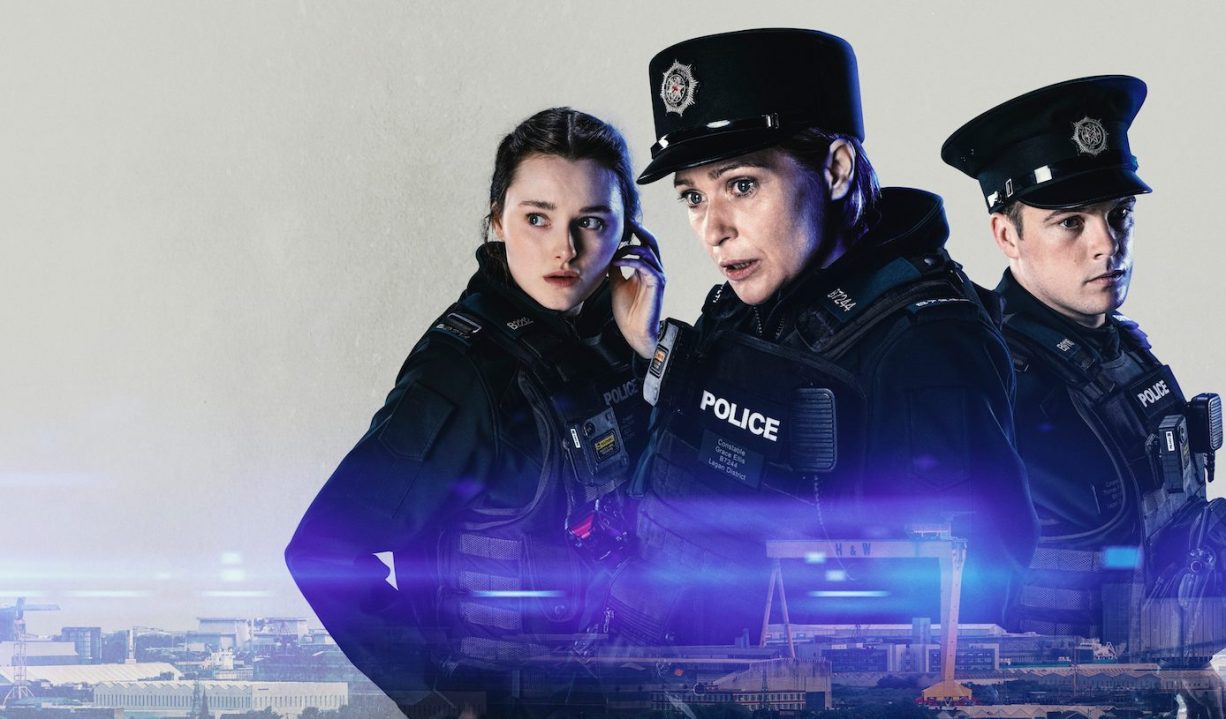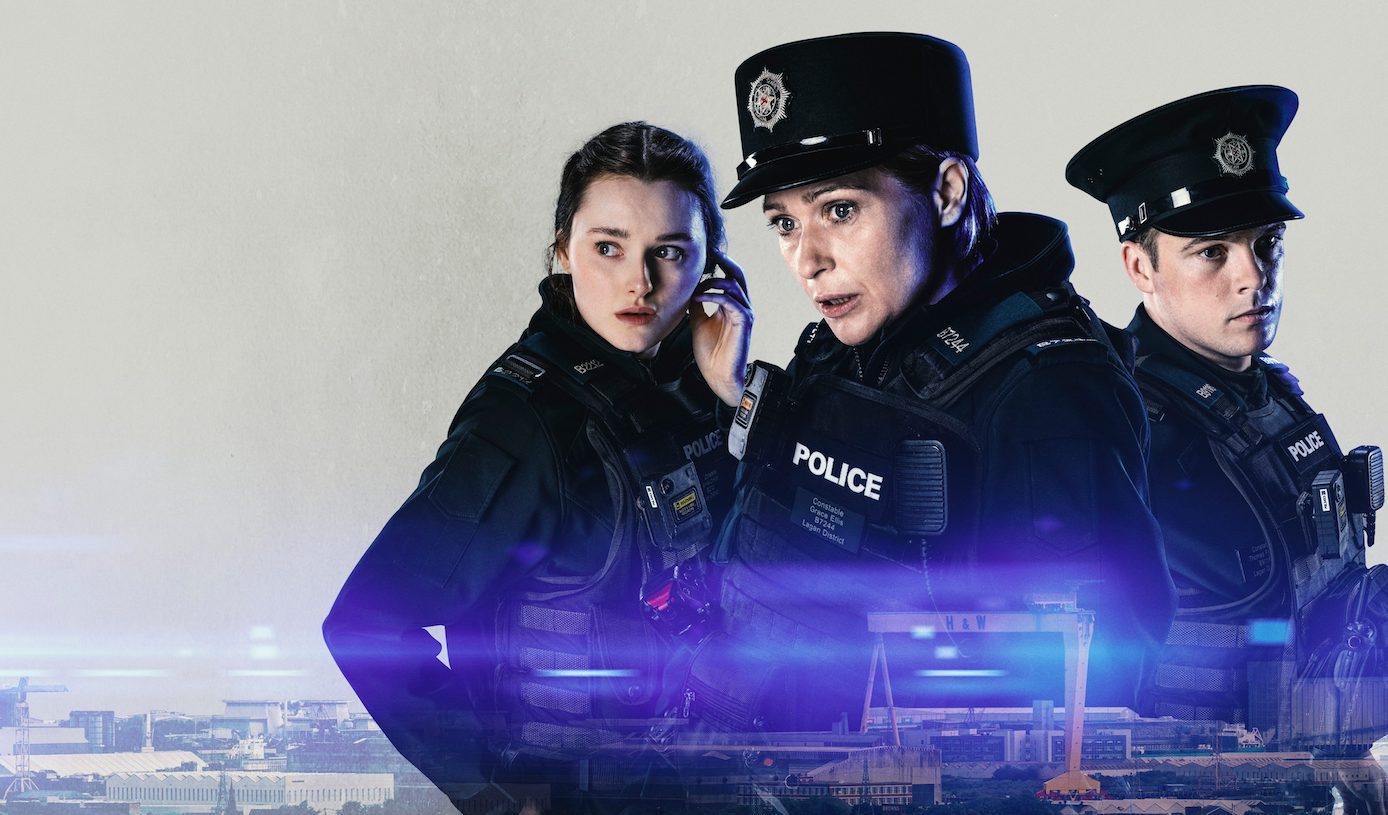‘Remember your training Grace, get the rifle.’ We’re only moments into the opening episode of the superb new police procedural Blue Lights when we are reminded this is a very different cop show. In Northern Ireland, where it is set, policing the semi-skimmed peace still carries the additional risk of being ambushed by terrorists. Being tooled up, even for a traffic stop, can be a matter of life and death.
Any of us who have worn a uniform while wet behind the ears can empathise with the struggle of these three new officers
Grace and Stevie, her mentor – and possibly more as the series develops – are two central characters in a six-part BBC drama that manages to humanise the lives of the men and women in the Police Service of Northern Ireland without mawkishness. It follows three rookie cops working in a threadbare and often overwhelmed Belfast response team. Readers old enough to remember Hill Street Blues, the groundbreaking US cop show that introduced us to the idea that police officers were three-dimensional characters with flaws as big as their strengths, will not be disappointed. The Northern Irish writers Declan Lawn and Adam Patterson who created this gem grew up in Belfast and are both old enough to remember RUC officers – that body of constables now incorporated into the PSNI – being murdered, often while responding to routine calls. This unquiet past frequently intrudes into the lives of officers policing the present: finding ways to check your car for booby traps without drawing the attention of your neighbours; carrying a pistol off duty for personal protection; disguising what you do for a living; not being allowed into ‘out of bounds’ areas with no reasons given. All these striking abnormalities bind the cops, including those on probation, into a camaraderie that is beautifully exposed; the insularity it creates is unsparingly examined too.
The unique stresses of policing modern Northern Ireland are well illustrated by a talented cast and a deft, often mordantly humorous script. But a show focused on the peculiarities of policing Northern Ireland alone would be insufficient to hold the viewers’ attention. Instead, the series puts these challenges into context with a number of plotlines, some lasting through the series, and some episodic set pieces that bring the characters to life. They also expose the brutal calculus of policing a contested society – the conflict between doing what’s right and doing what works. We have encounters with drunk drivers, bad batches of drugs, domestic violence, and paramilitary polycriminals who have switched from ideology to drugs while retaining the same ruthless coercive control of the communities they prey on. There is a particularly harrowing scene when a teenager is ‘kneecapped’, the euphemism for mutilating children who break criminal codes with roots deep in the terrorism of the Troubles. It shocks, not because of any gratuitous splatter but in the grotesque dread of parents made to arrange their son’s disfigurement by appointment. There’s never enough time for the cops, they are frequently run out of hostile neighbourhoods with a hail of rocks and the rule book is frequently out the window – much to the bewilderment of earnest probationer Tommy who can’t shoot straight to save his life, a defect that might terminate his career before it has begun. Meanwhile his colleague newbie PC Annie Conlon circles the drain because she can’t do the job sober and she freezes in a memorable encounter with street-wise hoods in episode two who tie her in knots with their superior knowledge of the law before putting her on her arse.
Any of us who have worn a uniform while wet behind the ears can empathise with the struggle of these three new officers plunged into a working world where the training school feels like another planet. And yet the success of Blue Lights is that it feels somehow familiar to a GB audience, largely insulated from the visceral realities of policing a still divided community. Office politics, ambition, eccentricity, attraction and the exhaustion of a work-life balance where too much is never enough will resonate because the characters in this series, even those drawn as objectionable, are believable enough to make the viewer care about what happens next.
The diversity of modern Northern Irish society is also revealed. There is a sweet and poignant relationship between the black custody sergeant and one of the rookie’s mentors, Gerard, played with enormous skill by Richard Dormer, best known as Beric Dondarrion in the HBO television series Game of Thrones. Annie is recognisable as a young Catholic officer in a traditionally Protestant force who is put under threat by dissident republican terrorists and who has to leave home as a result. Grace is an English social worker with a complex back story who has fallen in love with Northern Ireland and changed jobs. She has a mixed-race son who experiences racist behaviour. There are many types of ‘other’ in this place. Jen Robinson, admirably played by Hannah McLean, is a nervy and frequently terrified fast-track graduate officer who we are invited to dislike but who manages in a raw and explosive finale to find the bravery she needs. Strong, credible female leads abound here in an organisation and a society formerly known for macho conservatism.
It’s not all perfect of course. The interference in day-to-day policing by the security service in a major plot theme is characterised by some truly cartoonish stereotyping. There are some procedural howlers that have clearly been let loose in the service of the storylines. But these are minor niggles. The good news is that a second series has been commissioned. It’s even better news if you haven’t yet caught up with the exploits of Blackthorn police station’s response team, you’re in for a rare treat.






Comments